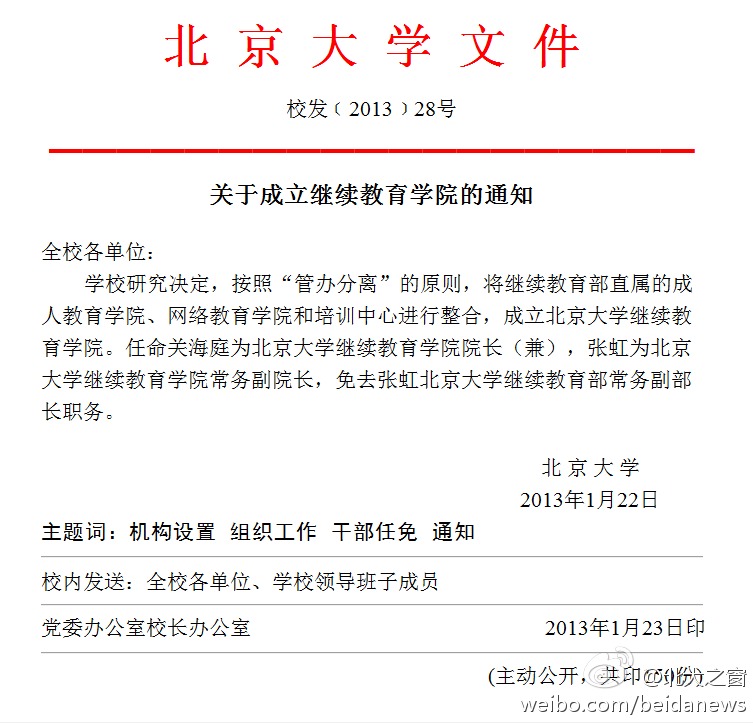Peking University, Mar. 26, 2013: “The role of the PKU continuing education is to be part of the PKU process to build a world-class university and to serve the society,” said the dean of the newly launched PKU School of Continuing Education.
Speaking on approaches to the role, Professor Guan Haiting, also vice provost of the university, emphasized high-end training, online education platform, and diploma education.
“The diploma education should be strictly controlled, its management enhanced, and quality ensured,” added Professor Guan in an interview on March 19.
It is with the purpose to improve management that the new School of Continuing Education was established earlier this year, said Professor Guan. It solved the problem of “being both judge and player” by separating the “managing and running” functions of the former Office of Continuing Education.
The new school, through the merger of the School of Adult Education, School of Distance Learning, and Training Center under the former office, operates as an independent college, offering education programs to the public, said Professor Guan.
The new Office of Continuing Education retains the mechanism to oversee the university’s continuing education on behalf of PKU and its president.

The PKU document dated Jan. 22, 2013 on the launch of the PKU School of Continuing Education and appointment of Guan Haiting as dean
Online courses: key to the PKU dream
The dream to attend PKU “could be realized online,” said Professor Guan, emphasizing the role the Online Open University plays in the development of continuing education at PKU.
"I have a dream that people who would like to attend Peking University could have access to the PKU education," the then President Zhou Qifeng detailed his "Chinese dream" at the annual National People's Congress (NPC) session earlier this month. He believed this is possible with modern technology, mainly through the online education platform.
It is difficult, said Professor Guan. “But we have to do it.”
Two types of education: in harmony?
“Young students complained to us when the scale of continuing education got colossal,” said Professor Guan, who also supervises the PKU undergraduate program. The two duties integrated, “which is hard,” said Professor Guan.
He emphasized that “undergraduate education is still the top priority of Peking University,” thus the development of continuing education should not pose a threat to it; rather, they are to thrive side by side. “When I was informed of students’ complaint on the oversized training classes on campus, I would immediately report to the president that continuing education shouldn’t have been operated in this manner.”
Professor Guan has worked on continuing education for around four years and was aware that continuing education is also what the university should consider in terms of further development. Professor Guan was content with his work of balancing these two types and balancing the economic and social benefits. “PKU should leave the society an impression of paying back, instead of profiting.”
Doubts and optimism
The continuing education at PKU has been confronted with doubts, though. Some questioned that it “grasped money” with fees ranging from tens of thousands to hundreds of thousands yuan.
Professor Guan responded: “The role of continuing education is clear — to serve the society. And we hope not to raise conflicts.” The most essential work is quality control. “We should set up classes with the pursuit of high quality rather than gigantic quantity. But we will not misappropriate resources that belong to undergraduates. For example, classrooms allotted to them are far from those for undergraduates.”
But the toughest task, Professor Guan admitted, was the coordination among training programs by schools and departments. Some unrelated schools or departments provided “popular” courses in economics and business management. This is a profound problem of systematic innovation, said the dean. “We need to serve other schools and departments. If we manage the students they recruited and we give them financial support in return, they will solve the funding problem while focusing on research and teaching.”
Though this model is still under trial, there are already successful cases. “I believe the PKU continuing education will be more professionalized,” Professor Guan added.
Written by: Chen Runxi
Edited by: Jacques
Source: PKU Youth